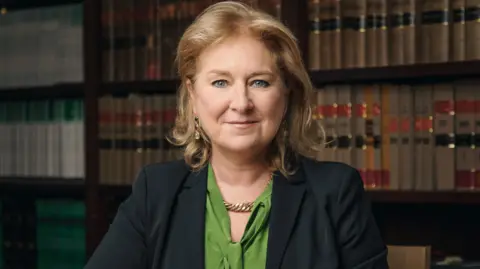Judge ’deeply troubled’ by PMQs exchange on Gazans settling in UK
The most senior judge in England and Wales has said she was "deeply troubled" by comments made by Sir Keir Starmer and Kemi Badenoch over a judge’s ruling in an immigration case.
Badenoch, the Tory party leader, had asked the prime minister about a decision to grant a Palestinian family the right to live in the UK after they originally applied through a scheme designed for Ukrainians, saying it was "completely wrong".
Sir Keir said he agreed, adding: "It should be Parliament that makes the rules on immigration".
But Lady Chief Justice Baroness Sue Carr said the remarks were "unacceptable" and conflicted with the duty of politicians to uphold the rule of law and respect the independent role of judges.
A government spokesperson said Sir Keir had "made clear that it is for Parliament to make the laws and for the government to decide policy."
Speaking at her annual news conference, Baroness Carr also said that judges’ concerns about their personal security were at an "all-time high" - thanks to attacks on social media driven by wider misreporting of their work.
The exchange between Sir Keir and Badenoch came during Prime Minister’s Questions (PMQs) last week.
Badenoch was critical of how an immigration judge had handled the family’s application, which she said was made under a scheme designed for Ukrainians fleeing the war. The case has been widely misreported and misunderstood.
Badenoch said: "A judge has now ruled in their favour. That is not what the scheme was designed to do.
"This decision is completely wrong, and cannot be allowed to stand. Are the government planning to appeal on any points of law, and, if so, which ones?"
The full reading of the judgement reveals that the family of six - a mother and father, and their four children - had sought permission to live with a British relative who proved he was able to house and financially support them.
Part of their case had been that they were political opponents of Hamas, which is banned in the UK under terrorism laws.
The family, whose home in Gaza was destroyed by an air strike, have been granted anonymity.
Their initial application had been incorrectly made using a form reserved to help Ukrainian families reunite. They eventually won permission to stay under entirely separate general human rights considerations. These allow families from any background to make a case to reunite if there are compelling reasons to do so outside of standard immigration schemes.
This detail, including the specific risks the family say they faced, was not spelled out at PMQs, with Sir Keir saying the case had been one that had been dealt with under the Conservatives.
Replying to Badenoch, Sir Keir said: "Let me be clear: I do not agree with the decision. The leader of the opposition is right that it is the wrong decision.
"She has not quite done her homework, however, because the decision in question was taken under the last government, according to their legal framework."
He went on: "It should be Parliament that makes the rules on immigration; it should be the government who make the policy. That is the principle. The home secretary is already looking at the legal loophole that we need to close in this particular case."
The prime minister has not specified what the "legal loophole" is that he wants to close.
Meanwhile, the two Upper Tribunal judges, who granted the family permission to reunite in the UK, said that their decision was not creating a Palestinian settlement scheme, but dealing with a complex and exceptional case.
They had not been presented with any evidence from the government that this family’s unusual case would open "floodgates".
The UK currently has schemes for some Afghans, Ukrainians and people from Hong Kong to come to the UK, but no route for Palestinians.
Reflecting on the PMQs clash, Baroness Carr said on Monday that "both the question and the answer were unacceptable".
"It is for the government visibly to respect and protect the independence of the judiciary," she said. "Where parties, including the government, disagree with their findings, they should do so through the appellate process."
She also said MPs, "just like the governing body, have a duty to respect the rule of law". Her officials had now written to the prime minister and the lord chancellor’s offices.

Responding to Baroness Carr’s comments, Badenoch said "politicians must be able to discuss matters of crucial public importance in Parliament" - and that such debate "doesn’t compromise the independence of the judiciary".
"This is not just some legal loophole that can be closed, but requires a fundamental overhaul of our flawed human rights laws," she said in a statement on X.
A government spokesperson said: "Where the law is not working as we think it should be, the government will take action to tighten up the rules - and that is what we are doing".
"As a former chief prosecutor, the prime minister’s respect for the judiciary, the role they play in our democracy and the rule of law is beyond question," the statement added.
Making a wider point about concerns over the safety of judges, Baroness Carr said it was "not acceptable for judges to be the subject of personal attacks for doing no more than their jobs".
"Their job is to find the facts on the evidence before them and apply the law as it stands to those facts," she told reporters. "If they get it wrong, the protection is a challenge on appeal. If the legislation is wrong, it is Parliament’s prerogative to legislate."
"It is really dangerous to make any criticism of a judgment without a full understanding of the facts and the law," the lady chief justice said - adding that judges are "public servants acting independently" and that, "frankly, judges deserve better".
Read more similar news:
Comments:
comments powered by Disqus


































